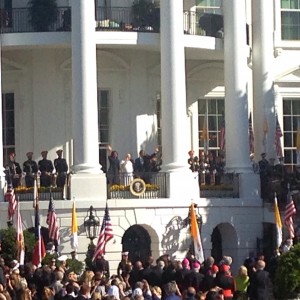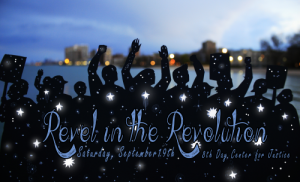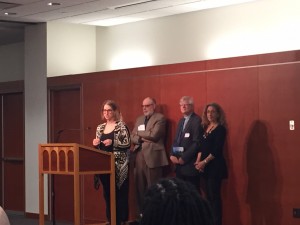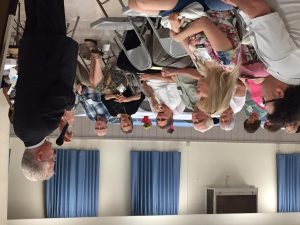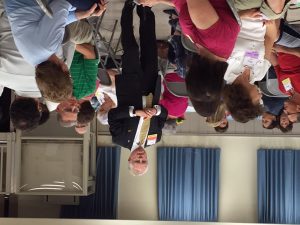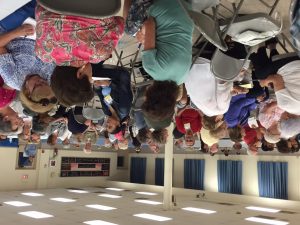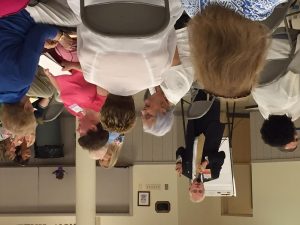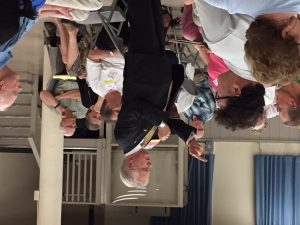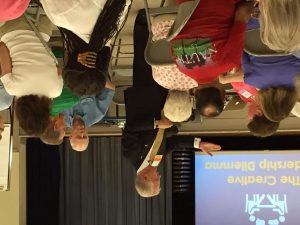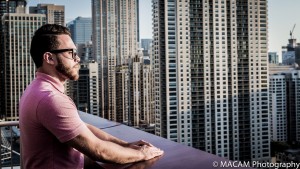IPS Professor Marian Diaz made a quick trip to Washington, D.C. with her husband Miguel Diaz who is the former U.S. Ambassador to the Holy See and is currently The John Courtney Murray University Chair in Public Service at Loyola’s Hank Center.
“We were at the event where the Holy Father was received by the President at the White House. That was very exciting.”
Very exciting, but very early. “We had to be there bright and early Wednesday morning, but it was very well organized going through security and the weather was fantastic.”
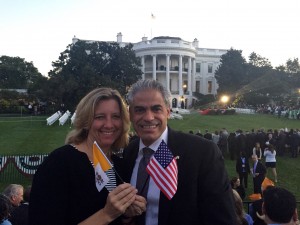
After waiting for a few hours for the Pope to arrive, the site of his vehicle driving up was something to see, recalls Marian. “I was aware that he was riding in a Fiat because of his arrival the day before at the air force base, but seeing that Fiat pull into the drive way of the White House was just stunning. The enormous black security cars around it just dwarfed it.”
The ceremony itself was very formal. There was not a big processional, but there were a number of bishops, cardinals, the current Ambassador to the Holy See, the Vice President and other VIPs in attendance. The anthems for the Holy See and the U.S. were played and all U.S. armed forces were represented.
President Obama spoke first followed by Pope Francis. Upon conclusion, they made their way to the balcony of the White House and waved to the throng of people.
“It was just exciting to hear the Holy father’s remarks and the President’s remarks and have them be so well aligned in terms of issues they were addressing. Having worked at the nexus of the U.S. administration and the administration of the Holy See for so long, I’m just really happy to see them working together in a more constructive way on concerns we have in common.”
Marian has done a lot of work on Laudato Si’, the encyclical on the environment, so she was pleased with what she heard about uniting the environment and social issues. Rather than keeping labor, private property, the basic rights of humanity, etc. separated, Pope Francis is “now showcasing all these issues and economic issues in a package which also considers our environment,” noted Marian. “He’s calling us to respond to the cries of suffering creation around us and to really respond to that, but not in a way that the issues remain isolated. He wants these to all be seen as human issues in developing what he calls an integral ecology. There’s a great urgency that I think he brings to these questions, along with our president and I just hope we will have some constructive actions moving forward.”
Years ago, Marian had a realization that environmental issues had to be addressed now and the sooner, the better.
“I really agree with the line ‘we can’t leave it until the next generation.’ I had this moment when my kids were younger and I was driving them to school, listening to another news program about the environment and I said to them, ‘kids this is the issue for your generation.’ Then I realized, no that’s wrong. This has to be the issue for my generation. It has to be addressed now. We just can’t wait.”
Moving forward, “I’ve seen a change in our government’s approach in dealing with these issues and also in terms of the Holy See, in the way that they see the need to partner with other religious entities, with secular society and with other governments in coming to a solutions for these problems. So I see them more open to collaborating and partnering and that’s really encouraging.”
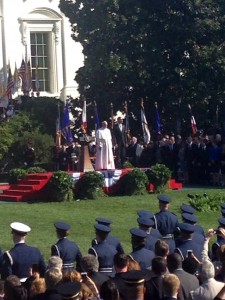
Marian went on to discuss the excitement and anticipation that follows the Pope wherever he goes.
“At the White House itself, the crowds were controlled and everything was structured, but you could tell that people really wanted to be there. You could definitely feel the energy and the excitement.”
Pope Francis is frequently called the people’s Pope and is loved by many people even those outside of the Catholic faith. Marian sheds some light on why she thinks that is.
“His first Apostolic Exhortation is called Evangelic Gaudium, The Joy of the Gospel. He’s happy! He exudes joy and he encounters people gladly and happily,” Marian exclaimed. “And you have the sense that when he encounters people one on one, he wants to be present to them.”
People appreciate when they feel seen, heard and acknowledged and Pope Francis knows how to engage with people.
“It doesn’t mean everybody is going to agree with him on everything, but when someone’s there that you feel you could relate to and that you are heard, it makes a big difference,” said Marian.
While in D.C., Marian also noticed an uplift in the hopes and spirits of those who fight for social justice.
“For people who work on justice issues, he’s really reinvigorating them by giving them new hope and new energy. People who have worked on issues year in and year out… and, given the tone in Washington and the lack of progress, I can just imagine how easy it would be to give up. His presence, his message, his authority and his openness I think, hopefully, will energize Washington and people to really start making progress.”
**Join the conversation by following @BrianSchmisek on Twitter and @LoyolaIPS on Instagram! Also, network with the Loyola Chicago IPS community on LinkedIn.
